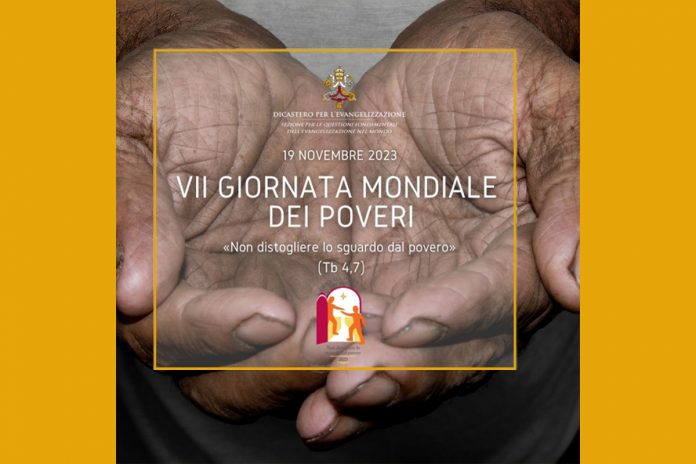Rome (Italy). On 19 November 2023, on the Sunday preceding the Feast of Jesus Christ King of the Universe, the 7th edition of the World Day of the Poor is celebrated, proposed for the first time in 2017 and strongly desired by Pope Francis to urge the Church to “go out” to encounter poverty in the many ways in which it manifests itself in today’s world.
«Do not turn your face away from anyone who is poor» (Tb 4,7) is the theme of Pope Francis’ Message for Day 2023, “an appointment – observes the Holy Father – that the Church is progressively taking root in its pastoral care, to discover more and more the central content of the Gospel.” He also points out that, despite the commitment to respond to the poor, “a river of poverty runs through our cities and becomes bigger and bigger until it overflows. This river seems to overwhelm us, so much so that the cry of brothers and sisters asking for help, support, and solidarity is getting louder and louder.”
A new feature in this year’s Message is the reference to the world of youth. The elderly Tobit, who fears he will never be able to see his son again, leaves him his ‘spiritual testament’. As Tobi himself recounts, says the Pope, “his life from a young age was dedicated to works of charity: ‘I performed many acts of charity for my kindred and my people who had gone with me in exile to Nineveh in the land of the Assyrians… I would give my food to the hungry and my clothing to the naked; and if I saw the dead body of any of my people thrown out behind the wall of Nineveh, I would bury it’.” (1:3.17)
From this perspective, Tobit as a good father, wishes to leave his son not so much some material goods, but the testimony of the path to follow in life. Therefore, he tells him: “Revere the Lord all your days, my son, and refuse to sin or to transgress his commandments. Live uprightly all the days of your life, and do not walk in the ways of wrongdoing” (4:5). We see immediately that what the elderly Tobit asks of his son is not simply to think of God and to call upon him in prayer. He speaks of making concrete gestures, carrying out good works, and practicing justice.
As regards the Salesian educational mission, operating “in a society strongly centered on having, the experience of free gift and disinterested service – like what Tobi indicates to his son – is offered rich in educational virtuality. (…) Often the experience of service reveals itself as the beginning of a deeper journey of maturation. The current phenomenon of human mobility offers the opportunity for youth of all contexts to share with many men and women the uprooting from their own cultural identity and the process of adaptation and creation of new syntheses; to experience hospitality, compassion, and to experience the needs of intercultural, ecumenical, and interreligious dialogue.
In service to the poorest, young men and women can express their evangelical citizenship and prepare to intervene at different levels in the polis as thoughtful, responsible people and promoters of justice and peace” (Guidelines of the Educational Mission of the FMA, 90).
In his Message, Pope Francis urges us to have Tobit’s concern, which implies getting involved in the mutual encounter. “ When speaking of the poor, it is easy to fall into rhetorical excess. It is also an insidious temptation to remain at the level of statistics and numbers. The poor are persons; they have faces, stories, hearts and souls. They are our brothers and sisters, with good points and bad, like all of us, and it is important to enter into a personal relation with each of them. The Book of Tobit teaches us to be realistic and practical in whatever we do with and for the poor”.
Welcoming Pope Francis’ invitation “Do not turn your face away from anyone who is poor”, the Dicastery for evangelization provides a Resource in various languages with pastoral proposals to give substance to human gestures towards real people. The suggested proposals are in three categories – Preparing with prayer, Living in the liturgy, and Acting with charitable deeds – and can be adapted and contextualized according to the local reality.
In line with these proposals, the third priority choice of the XXIV General Chapter of the Institute of the Daughters of Mary Help of Christians asks us to listen to the “cry of the young, the poor, and the earth”, specifically to “give new impetus to the first proclamation of Jesus, to evangelization, to pedagogical, pastoral, catechetical, and communicative formation, according to the Christian anthropological vision.” In this regard, it may be significant to draw from the proposals of the Dicastery’s Resource and carry out a special catechesis for young people and children on poverty, inviting them to discover who the poor are that they encounter in their daily lives: those who live on the margins, those who have no relationships or friendships at school, those who live in uncomfortable situations.
GC XXIV also urges the Educating Communities to “dare prophetic and concrete gestures in promoting a supportive and sustainable economy, to share resources and skills with more courage, in the perspective of the missionary dimension”.
Pope Francis repeats: “We are called to acknowledge every poor person and every form of poverty, abandoning the indifference and the banal excuses we make to protect our illusory well-being”.




















